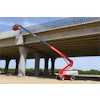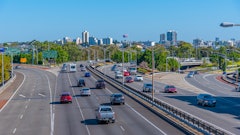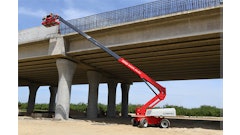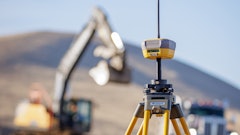Current taxes on gasoline and diesel fuel, levied at a fixed cents-per-gallon rate, are the primary sources of transportation funding at the state and federal levels. But, due mainly to increasing fuel economy and fuel tax rates that are not adjusted to inflation, revenue generated by those taxes is increasingly inadequate.
The study "State and federal fuel taxes: The road ahead for U.S. infrastructure funding" forecasts state and federal tax revenues that would be generated by:
- Indexing gasoline and diesel taxes to inflation
- Applying state sales taxes to fuel prices, plus an inflation-adjusted excise tax
- Implementing a vehicle mileage tax
According to the study, fuel tax revenue will decline by up to 50.5% between 2015 and 2040 in states that do not adjust fuel taxes to inflation.
The study notes that the federal gasoline tax was set to .184 cents per gallon in 1997. As a result of the increase in the Consumer Price Index since 1997, the purchasing power of fuel taxes declined 31% by 2012.
The fuel-tax revenue decrease will be smaller, between 3.4% and 16%, in states that currently adopt inflation-adjusted fuel taxes.
For states that currently neither adjust for inflation nor impose any sales taxes, charging a vehicle mileage fee would increase tax revenue by 54% to 101%, with a median change of 62% by 2040.
"Our results indicate that although a mileage fee is politically and technologically difficult to achieve, it is the only measure that avoids a declining tax revenue in the long run," said study co-author Jerome Dumortier, assistant professor in the School of Public and Environmental Affairs at Indiana University-Purdue University Indianapolis.
Since fuel economy is increasing over time, the cost per mile driven is decreasing for the average car driver under all tax and mileage fee scenarios.
Changing the fuel taxing system won't be easy, the authors say, citing studies that show people oppose financing roads with vehicle mileage taxes, higher fuel taxes, sales and income taxes, and tolls. "But the conclusion that the U.S. surface transportation system will gradually deteriorate without a new or additional dedicated source of transportation funding is universal," Dumortier said.
The study "State and federal fuel taxes: The road ahead for U.S. infrastructure funding" will be published in the January 2017 issue of the journal Transport Policy.










![Hcm Ax Landcros Dual Branded Logo[25]](https://img.forconstructionpros.com/mindful/acbm/workspaces/default/uploads/2025/11/hcmaxlandcros-dual-branded-logo25.Qhg3vUCjoK.jpg?ar=16%3A9&auto=format%2Ccompress&bg=fff&fill-color=fff&fit=fill&h=135&q=70&w=240)




